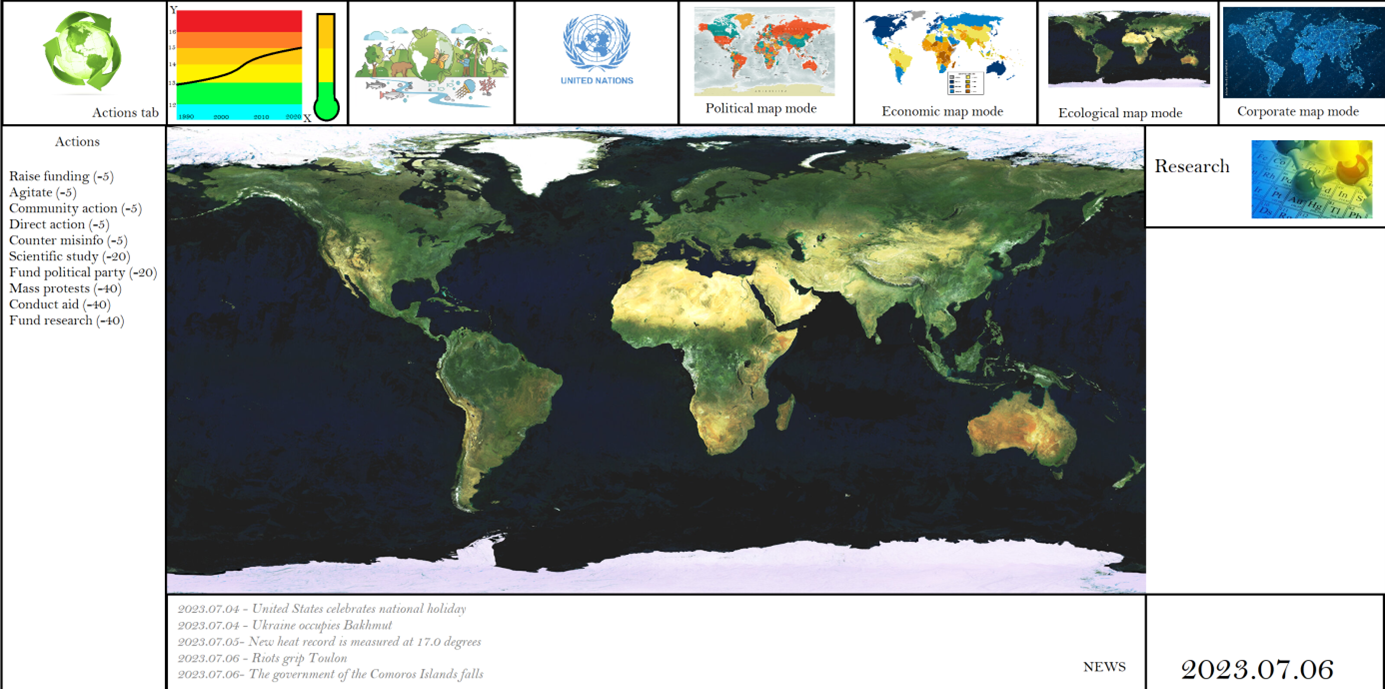Introduction
Recently in my country of Sweden, a conservative news columnist has come under fire for suggesting that media reports about a record hot summer were alarmist in nature, and thus she is accused of being a climate change denier, and calls have been raised on the platform previously known as Twitter to de-platform her.
Her defenders on the other hand claim that she is not denying climate change, but offering a critique against the habit of connecting future potential heatwaves as well as weather phenomena with climate change.
What this public spat points out is that the messaging about climate change is prone to misunderstandings, and to a contentious public debate which sows confusion and depolarization.
We live in a time of ecological crisis, in terms of climate change, soil erosion, freshwater depletion and ecosystems deterioration. Each of these crises represents an existential crisis against not only industrial civilization but also for higher lifeforms on our planet. This is not the first global ecological crisis which our species have faced – but it is unique in two regards. This time we are 1) aware of the looming crisis and 2) are largely the cause of the crisis, due to our collective over-exploitation of our biosphere.
In the same time, for various reasons, it is a culturally, economically and politically difficult, nearly insurmountable task for our species to muster a comprehensive and effective strategy to stop damaging the ecosystems which we depend on for our sustenance.
It could be argued that one of the factors which prevent the effective dissemination of the gravity of the situation is information overload. A typical citizen today is bombarded with information, news, outrage, enticement, distractions and fear for all their free time. Attention is divided, and the ability to discern relevant information from trash is diminishing among the generations who are growing up with social media.
Ideally, there would need to be a cultural revolution to reduce the amount of information stasis constantly bombarding a stressed out, anxiety-ridden populace, but in the mean-time, maybe the strategy to disseminate information about climate change could be revised?
Clearing the table – instituting severity levels
Man-made climate change – i.e. how the emissions of fossil-based greenhouse gasses reduce the amount of heat evaporating from the Earth by thickening the Earth’s atmosphere – is a complex issue which affects everything on the planet. It is an elaborate, complex puzzle with tens of thousands of pieces, and scientific institutions do not yet fully grasp its implications.
I would argue that if the media would be sincerely interested in helping to provide the public with a clearer understanding of climate change, its effects would need to be divided into several levels.
These levels would be roughly constituted along the line of the potential severity of the short-, medium- and long-term effects. I will provide one example here below.
- Level One (Yellow): Effects which are localized, disturb local economies, increases the likelihood for extreme weather, forest fires, reduce tourism income or lead to higher demand for cooling.
- Level Two (Orange): Slow-moving long-term changes which will demand social intervention on a centralized, large scale, for example sea level rise and changes in agricultural productivity.
- Level Three (Red): Very severe effects which will not only disrupt human civilization but also permanently affect the living conditions regionally or globally, and threaten to cause civilizational collapse. Examples are the melting glaciers of the Himalayas, the weakening of the AMOC (of which the Gulf Stream is a part) and the greening of the equatorial seas, which threatens plankton reproduction and thence the global reproduction of Oxygen (arguably the greatest threat of climate change).
Ideally, I would argue that the third severity level needs to be emphasized in the public messaging about climate change.
As it looks now, it seems like most of the public associates climate change with two factors – the first one being that the temperatures generally will become warmer and the second that the seas will rise due to the melting of the Greenland ice sheet. It would not be surprising if most of the public primarily associated climate change with the risk of increased flooding. This causes several problems with communication, as it opens up the opportunity for climate change denialists to (correctly) point out that the raising of the sea levels is a slow process, that it is expected to take millennia for the Greenland ice sheet to collapse, that rising GDP levels (since they ignore all other factors) will make it possible for countries to invest in sea walls, and that even a poor country like Bangladesh is investing heavily in sea walls and have even regained some land during the last two decades.
The focus on sea level rise is understandable – the public interest is awoken both by the fact that most of our species are living on lowlands and at coasts, and by the Flood myths inherited from ancient civilizations. But it is not a good thing when the public cares for climate change on behalf of an issue which is understood in a flawed and dare I say alarmist manner.
That 75% of the Himalayan glaciers may be gone by the year 2100 (ICIMOD, 2023) is a much more serious threat against the well-being of the peoples of Bangladesh (and India, Pakistan, Myanmar, Laos, Vietnam, China…) as it would represent a collapse of food production, ecosystems, soil and fresh-water reservoirs, and threaten the stability of the entire Eurasian landmass.
Likewise, the weakening of the Atlantic Meridional Overturning Circulation (AMOC) due to the warming of the arctic seas could very well cool northern Europe to temperatures which move towards Siberian and Alaskan levels – which would probably be great for winter sports but disastrous for agriculture and heating. This would also represent a permanent and unalterable facet of climate change, which is more difficult to adapt against than building sea walls on the Danish islands.
This is another reason for being cautious on reporting about for example the end of winter mountain sports in Scandinavia, as climate change as a phenomenon is so complex that it affects other systems – like sea currents – which in their turn can affect the outcome in a different but even more undesirable outcome.
When newspapers, governments and green organisations speak about climate change, we should do it in terms of focusing on the threats which are existential in nature. Plankton and seaweed produces around 50% of the Oxygen on the planet. If the phytoplankton living near the arctic waters are threatened by extinction, it can cause a reduction of oxygen regeneration which can threaten animal life globally. This could herald a mass extinction event which will affect us.
Summary
Of course, the certainty of these cataclysms could be put into question – but what we need to act upon is not the chance that they won’t occur or that the trends would be reversed, but that these events may occur. If we would have reasoned around aerosols as the climate denialists or minimizers are doing with the climate, Australia, New Zealand, Chile and Argentina would probably have enormous amounts of skin cancer occurrences today, and would have had to adapting into becoming the first ever nocturnal human societies.
Even without climate change, there is a need to transition to a zero-fossil society before the lack of economically accessible oil does that for us, and builds us into an economic high energy trap. The economic forces which want to keep the perception of the viability of fossil energy are reactionary beyond the level of self-destructiveness, and the economic sustainability of oil must be more vigorously questioned. Not the least, there must be a demand for and a public debate about the banning of the prospecting of new oil fields.
But before that, we need a better debate about climate change.
And the debate we need may need to be more concise and focus on the most serious implications of climate change – especially regarding its effects on glaciers, ocean currents and long-term habitability. There are other severe issues which I probably for brevity’s sake have disregarded in this article, but the point is not what severe problems we are discussing, but that we must primarily highlight them, rather than bringing in everything from the problem of urban heatwaves to the increasing insurance costs of coastal habitation to the end of winter resorts in Scandinavia.
Though all of these issues may be true, the problem of including too many issues in the question of the seriousness of climate change are manifold.
- The public will be cognitively flooded with climate change to the point of nausea.
- Pointing out severe and mundane effects in the same setting will blunt the emotional and psychological impacts of understanding the severe effects.
- The more points will be taken up in the same articles, videos and information briefs, the greater the likelihood that misconceptions could arise and that our opponents could utilize these misconceptions to win tactical victories.
In short, what we need to do is to design the messaging with climate change in a manner which can focus the attention of the public on the need for radical reform, and to achieve that we need to focus on a few core issues (ideally fewer than five) and then repeat them constantly. These issues must be scientifically validated, and must be focused on what constitutes an existential threat with climate change.
The opposition to climate change reform is consisting of probably the most confused political forces in human history, who actively are working to create a political situation which will bring forth the opposite they claim to support (which generally is a free-market capitalist society, while opposition to climate change reforms must bring forth ever more statist and regulatory economics in the future to help correct the course).
What the Earth Organization for Sustainability is doing

Right now, we are in the early process of developing a single player computer game which would simultaneously serve as a simulator showcasing the effects of climate change, and as a strategy game where the player themselves can interact with and initiate policies intended to mend climate change through reforms, technological innovations, cultural changes or other means.
The name of the game is Climatopia, and we hope it will help increase the understanding of this topic.
If you want to help, you can contact us on enrique.lescure@eosprojects.com or support us through our Patreon (or Swish number if you live in Sweden).







